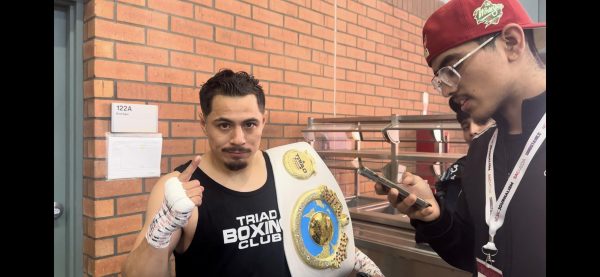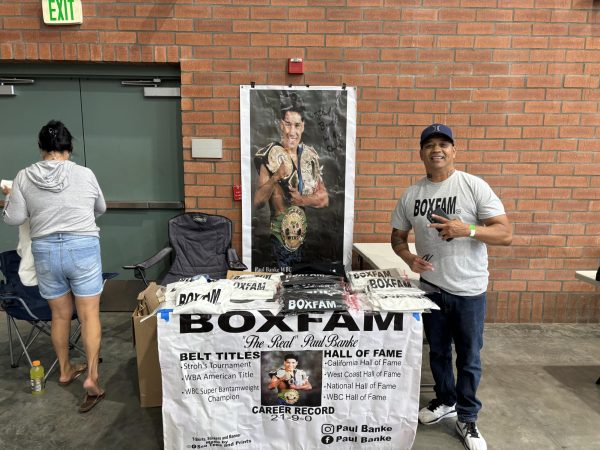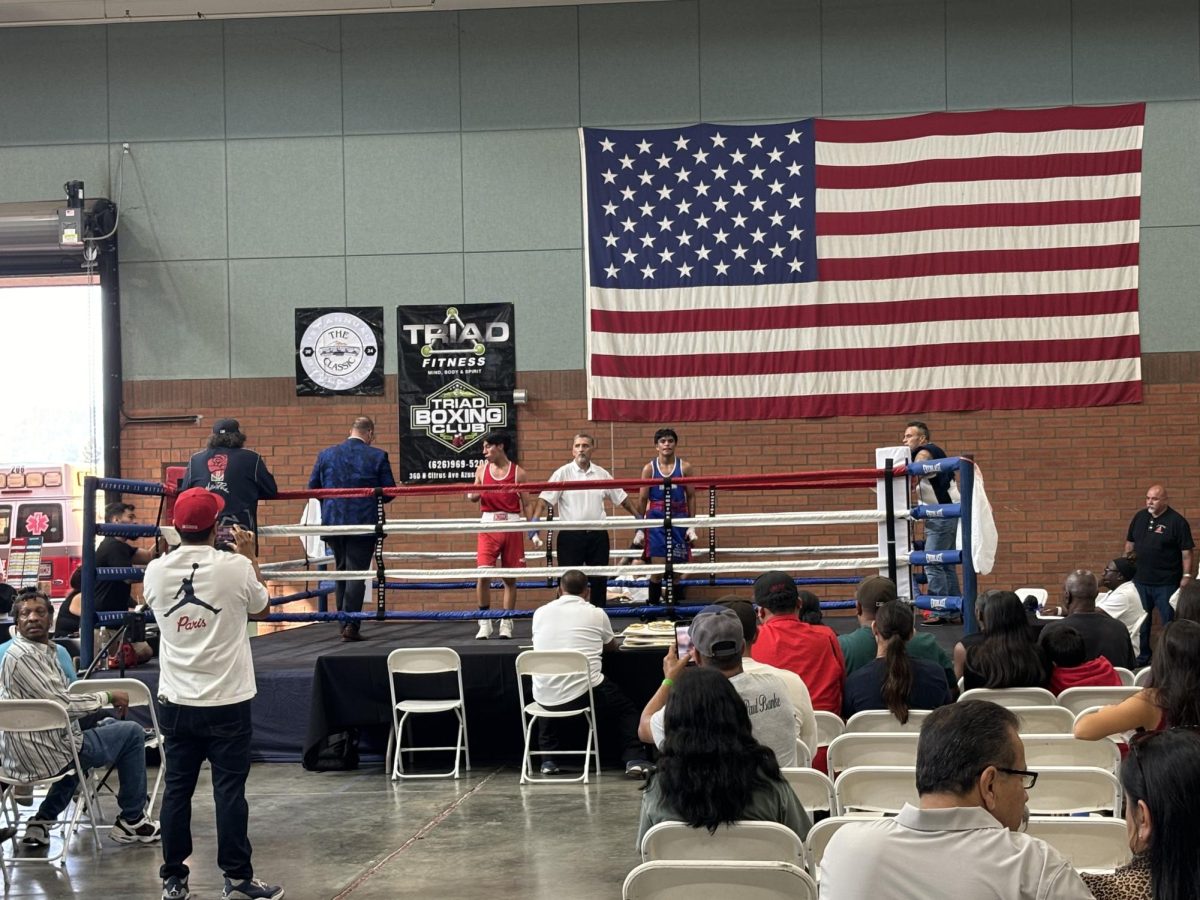On Oct. 13, Triad Gym brought back the Azusa Classic, featuring 20 amateur boxing matches, carnival games and food vendors, with the goal of supporting local fighters and small businesses.
Azusa hasn’t hosted a major boxing event in nearly 20 years, and the revival is expected to help reinvigorate the sport in Canyon City. While many gyms have tried to host large community events, none have succeeded.
Thanks to sponsors, partnerships and a successful boxing program, Triad Gym was able to hold the event in the U.S. National Guard facility at 1351 W. Sierra Madre Ave.
The matches were delayed until a medical official arrived, giving coaches time to strategize with their boxers and use the spacious venue. coach Clemente Medina ensured his fighter, Edgar Diaz, took advantage of the delay by running drills on the sidelines.
“He’s built world champions; he didn’t just get them. There’s a difference,” training partner James Guerrero, 26 said.
Among the youngest amateur boxers at the event was Evan Cortez, who has been fighting for nearly two years and participated in his fifth amateur bout. Cortez, 12, also plays All-American football and soccer when he’s not sparring in the gym. His coach, Louie Valenzuela, encouraged participation in other sports since boxing is a year-round commitment that can be focused on in shorter periods.
Not all matches featured Triad boxers vying for titles, but those who did fight won the majority of their bouts. “I want to dedicate this victory to my coach, Zack Padilla, a world champion from Azusa,” said Christian Alvarez, after he won by unanimous decision. This was his 13th amateur fight, and he plans to take a few months off before considering his next match.
Alvarez’s fight posed unexpected challenges, as his opponent weighed in at 143 pounds instead of the expected 129 pounds. The height difference also meant Alvarez had to “get in and work the body, or else he would have just jabbed me out,” he said.
An intermission after the 13th fight drew spectators toward food vendors, gift shops and carnival games.
One vendor sold custom-made mouthpieces for fighters, while another offered local favorites such as pupusas.
The U.S. Army National Guard facility featured a large boxing ring with ample seating for spectators. Traditionally, local fights were hosted by individual gyms, but this event’s open-air setup marked a departure from the norm.

Triad Gym is hosting these events to provide opportunities for fighters to improve their skills and encourage community involvement. The gym’s efforts are supported by other local gyms, and the city itself joined the cause by hosting the “Azusa Community Day of Champions” on Aug. 3.
“The city would like to thank the four local youth boxing gyms for their participation: Azusa Youth Boxing Club, Masters Boxing Association, Triad Boxing Club, and Velverde Boxing Club,” read a statement from the city’s official Instagram page.
The city made the event open to the public and Mayor Robert Gonzales attended to show his support for the community. According to Hey SoCal, “The Azusa Community Day of Champions drew over 1,000 attendees, city officials announced.”

For the past two decades, local boxing gyms have mainly worked in isolation, lacking the collaboration needed to create significant community events. Organizing these events requires time, effort and funding that one gym alone cannot provide.
According to USA Boxing, “All amateur bouts consist of three rounds lasting one, 1.5, two, or three minutes, depending on the boxers’ age and experience. The referee ensures fair play and may caution, warn, or disqualify boxers for committing fouls. Safety is the priority in amateur boxing.”
While boxing involves hand-to-hand combat, Triad Gym aims to counter the violent stereotype associated with the sport, promoting it as a positive outlet for channeling energy. It remains an Olympic sport, and rather than viewing it as purely violent, it can be seen as a form of therapy.
head coach Gary Garcia notes that boxing is more about “building a relationship with each and every one of them.”
Garcia has been boxing since the ’90s, and his coaching career took off later in his adult life. “I grew up in the gang life, I’ve been to jail, then worked in the oil refinery and the union, and now people are asking me how all this opened up to me,” he said.
“I tell them, don’t go down that road. I’ve been there, done that,” Garcia added.
Christopher Rodriguez and his team are dedicated to the self-improvement of gym members who come from various backgrounds. “A lot of our fighters come from single-parent households,” Rodriguez said, noting the absence of father figures in many young athletes’ lives.
The challenges at home weigh heavily on these young adults, who often seek ways to cope with their circumstances. Coaches Gary, Zack and David—all former gang members—have left that life behind and now work to guide others in the right direction.
At the gym, Garcia reiterated, “I tell them, don’t go down that road. I’ve been there, done that.”
Local boxing gyms often go overlooked because they’re considered more of an underground sport. Almost every high school in the U.S. has a football team, but the same cannot be said for boxing clubs. Despite this, local boxing gyms have remained active but are often underfunded.
Rodriguez took over management of Triad Gym nearly 12 years ago and has been a team player ever since. He and his team envisioned converting the yoga room into a boxing facility, and now two years later, the boxing program is a resounding success.
The gym is primarily operated by Manager Christopher Rodriguez, head coach Gary Garcia and coach Zack Padilla, each playing a critical role in running the gym and organizing events.
Through the Azusa Classic and future events, Triad Gym aims to offer young adults a positive outlet helping them navigate through their early adulthood. Organizing these events requires support from the local community to adhere to USA Boxing’s rules and regulations.


